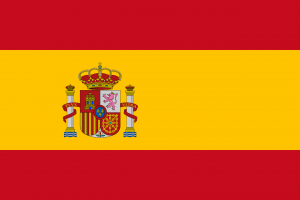Difference between revisions of "Language/Spanish/Vocabulary/Foreign-loanwords"
< Language | Spanish | Vocabulary
Jump to navigation
Jump to search
m (Quick edit) |
|||
| (One intermediate revision by the same user not shown) | |||
| Line 42: | Line 42: | ||
* '''Tour: '''From the French word for “turn, round, ride, or walk”, it is primarily used when talking about a trip or journey made by someone in order to perform artistically or to visit specific locations. In Spanish, it is a synonym for the native noun “gira”. | * '''Tour: '''From the French word for “turn, round, ride, or walk”, it is primarily used when talking about a trip or journey made by someone in order to perform artistically or to visit specific locations. In Spanish, it is a synonym for the native noun “gira”. | ||
<span link>After mastering this lesson, these related pages might interest you:</span> [[Language/Spanish/Vocabulary/Bird|Bird]], [[Language/Spanish/Vocabulary/Parts-of-a-fruit|Parts of a fruit]], [[Language/Spanish/Vocabulary/Seasons|Seasons]] & [[Language/Spanish/Vocabulary/PRECOLOMBINES-CIVILIZACIONES|PRECOLOMBINES CIVILIZACIONES]]. | |||
== source == | == source == | ||
https://blogs.transparent.com/spanish/spanish-words-of-foreign-origin-galicismos/ | https://blogs.transparent.com/spanish/spanish-words-of-foreign-origin-galicismos/ | ||
[[Category:Foreign-loanwords]] | |||
[[ | ==Other Lessons== | ||
* [[Language/Spanish/Vocabulary/How-to-Say-Hello-and-Greetings|How to Say Hello and Greetings]] | |||
* [[Language/Spanish/Vocabulary/Traduccion|Traduccion]] | |||
* [[Language/Spanish/Vocabulary/Hobbies|Hobbies]] | |||
* [[Language/Spanish/Vocabulary/Guatemalan-Slang|Guatemalan Slang]] | |||
* [[Language/Spanish/Vocabulary/Words-French-Origin|Words French Origin]] | |||
* [[Language/Spanish/Vocabulary/How-to-Say-Good-Bye|How to Say Good Bye]] | |||
* [[Language/Spanish/Vocabulary/Count-to-10|Count to 10]] | |||
* [[Language/Spanish/Vocabulary/Seasons|Seasons]] | |||
* [[Language/Spanish/Vocabulary/Days-of-the-Week|Days of the Week]] | |||
* [[Language/Spanish/Vocabulary/Conversation-connectors|Conversation connectors]] | |||
<span links></span> | |||
Latest revision as of 11:03, 27 March 2023
You will find below a list of the most common Spanish words or foreigh origin:
- Afiche: From French “affiche”, a piece of paper or other material showing a message, especially in advertising, like a poster glued onto a wall.
- Amateur: This noun means the same in both English and Spanish: a person who engages in any leisure activity—like sports—for nonprofessional purposes. It is a synonym of aficionado.
- Baguette: French word for the long loaf of bread that is an icon of French culture.
- Balotaje: It derives from the French “ballottage” (the second ballot). It is interchangeably used with “segunda vuelta electoral”.
- Boutique: Written as the French original, it means “store selling select products or fashion items”.
- Bulevar: It comes from the French “boulevard”, meaning a public road or thoroughfare generally used for strolling.
- Carnet: The French word refers to any kind of small notebook used for writing down numbers or notes. In Spanish, it gained an additional spelling (carné) and a more popular meaning: “identity card”.
- Casete: Derives from the French word “cassette” (cassette tape).
- Chalet: Coming from the French word for “country house” or “cabin”, in Spanish it means “small building housing one family.” As in the case of “carnet”, it may be spelled chalé.
- Chef: Unlike in French, in which “chef” means “boss” and can be used in different fields, in Spanish it is used only when talking about a “(kitchen) chef” o a “professional cook”.
- Chofer/Chófer: Derives from French “chauffeur” (driver).
- Cliché: As in English, this noun means “platitude” or “commonplace”, that is, an idea or phrase having been overused and lacking its original meaning. In French, it also means a photograph negative.
- Complot: It has the same meaning as the original word from French: “any kind of conspiracy targeting anyone or anything”.
- Debut: Both English and Spanish use this word in the same way, as it refers to “the first performance of an artist or the first presentation of a cultural product”, like a movie.
- Déjà vu: Once again, English and Spanish use this French loanword—which literally means “already seen”—for the same phenomenon: the sudden feeling of remembering an event that, in fact, is happening for the first time.
- Élite: As in French and English, this word (a noun as well as an adjective) refers to a “select group of people” or “group having a superior status”. In Spanish, it may be spelled “elite”.
- Gourmet: Referring to “someone or something of refined taste and/or superior quality”, this is a common word in English and in Spanish used when talking about food and drink.
- Menú: With a tilde on the letter u, “menú” is used the same as in English: it is the list of items offered by any eating establishment.
- Tour: From the French word for “turn, round, ride, or walk”, it is primarily used when talking about a trip or journey made by someone in order to perform artistically or to visit specific locations. In Spanish, it is a synonym for the native noun “gira”.
After mastering this lesson, these related pages might interest you: Bird, Parts of a fruit, Seasons & PRECOLOMBINES CIVILIZACIONES.
source[edit | edit source]
https://blogs.transparent.com/spanish/spanish-words-of-foreign-origin-galicismos/
Other Lessons[edit | edit source]
- How to Say Hello and Greetings
- Traduccion
- Hobbies
- Guatemalan Slang
- Words French Origin
- How to Say Good Bye
- Count to 10
- Seasons
- Days of the Week
- Conversation connectors
